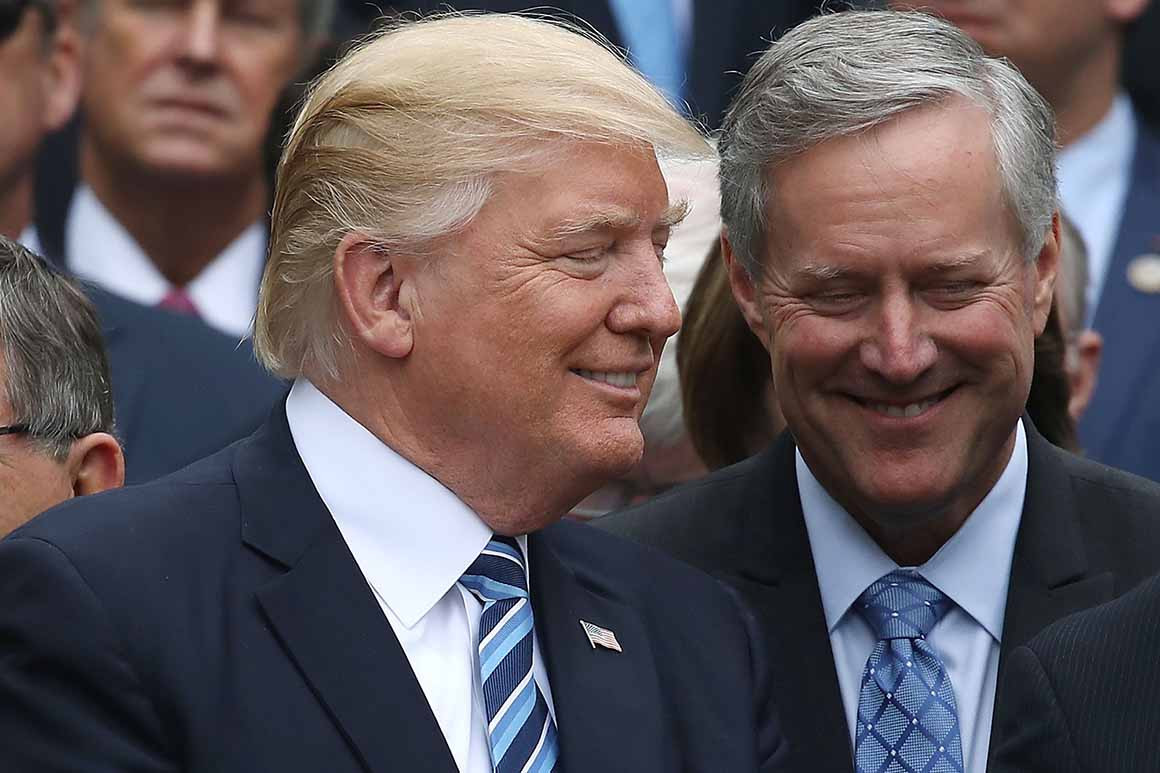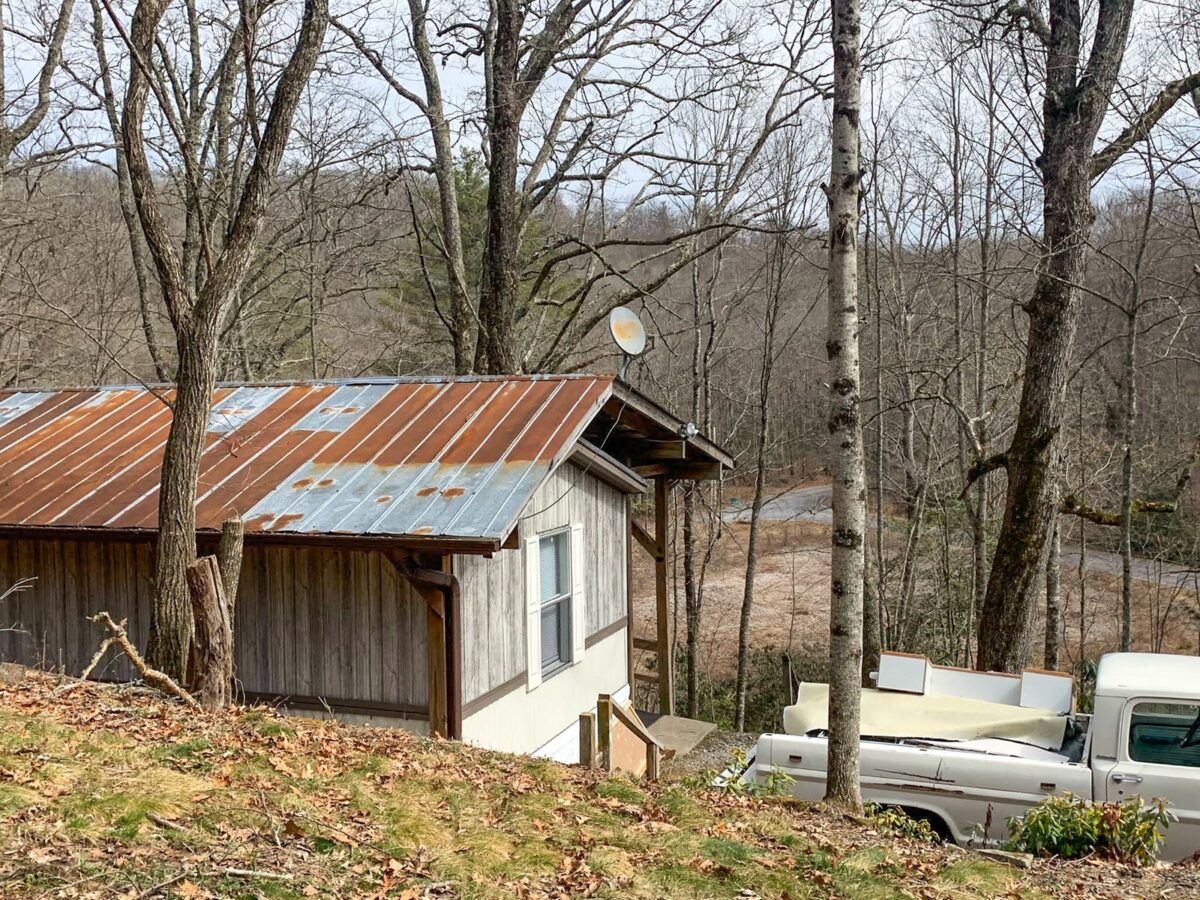The Big Picture –
By Glynn Wilson –
WASHINGTON, D.C. — Ladies and gentleman, it’s with mixed feelings of terrible sadness and great glee that we report to you today there was at least one clear case of voter fraud in the 2020 election. This is rich. Break out the popcorn.
You will be shocked and surprised to know that Trump’s “Big Lie” was not totally wrong after all. Voter fraud was committed — by none other than North Carolina Republican Mark Meadows on Trump’s behalf. This is verified and true. It’s not fake news.
It was first reported by Charles Bethea of The New Yorker, who was so kind to credit me for breaking the story when he reported out the famous case of former Judge Roy Moore being banned from the Gadsden Mall back during the 2017 special election for the U.S. Senate, when Birmingham Democrat Doug Jones bested Moore by 1.6 percent of the vote.
I’m happy to return the credit favor today, since Bethea has been snooping around in one of my other stomping grounds, Western North Carolina.
You may recall that Meadows was plucked from his House seat in conservative Western North Carolina (except for liberal Asheville) to serve as President Donald Trump’s White House chief of staff in March of 2020.
Trump never seemed to keep them long, since they all seemed to upset him in some way. Meadows was preceded by Mick Mulvaney, John F. Kelly and Reince Priebus.
After Trump lost the 2020 election to Joe Biden in Nov. 2020, Meadows was one of the most engaged members of Trump’s loyal lapdog league promoting the “Big Lie” that Trump really won the election and that Joe Biden’s victory was marred by “massive voter fraud.”
In the effort to please Trump, Meadows loved to go on and on about corrupt voters, “people just moving around,” as he said on cable TV news talk shows while pushing Trump’s “Big Lie.”
Meadows became active in local Republican politics in North Carolina after moving north from Florida, and ran for Congress and won in 2012. He was so devoted to kissing Trump’s ring in the House that Trump tapped him for chief of staff.
Earlier in March, according to real estate records, Meadows sold a 2200-square-foot house in Sapphire, and along with his wife Debbie, Meadows listed ownership of a condo in Virginia across the Potomac River from Washington, D.C., where he actually lived, apparently.
But to keep a legal residence in North Carolina in case he decided to run for a Senate seat, he was still registered to vote back home — with no legal residence in the state. Presumably he voted for Trump.
So according to Bethea’s reporting, about three weeks before North Carolina’s voter-registration deadline for the general election in 2020, Meadows filed his paperwork on Sept. 19, less than two months before the Nov. 3 election.
On the line where the form asked for a residential address — “where you physically live” — Meadows filled in the address of a 14-by-62-foot mobile home with a rusty tin roof in Scaly Mountain, near the Georgia line south of the Great Smoky Mountains National Park. He listed his move-in date for this address as the following day, September 20.
“Meadows does not own this property and never has. It is not clear that he has ever spent a single night there,” Bethea reports. “He did not respond to a request for comment.”
The previous owner, who asked The New Yorker not to use her name, now lives in Florida.
“That was just a summer home,” she told Bethea.
She seemed surprised to learn that the residence was listed on the election form of Meadows.
“The property sits in the southern Appalachian mountains, at about four thousand feet, in the bend of a quiet road above a creek in Macon County,” as Bethea describes it.
The former owner’s husband died several years ago, and the house sat mostly unused for some time afterward, she said, because she had “nobody to go up there with anymore.”
She only rented it out twice, she said, first to Debbie Meadows, who reserved the house for two months “at some point” within the past few years — she couldn’t remember exactly when — but only spent one or two nights there. The Meadowses’ kids visited the place too, she said.
The former owner was in Florida at the time, but her neighbors, the Talleys, whom she described as friends of the Meadowses’, briefed her later.
As for Mark Meadows, she said, “He did not come. He’s never spent a night in there.”
The former owner had put the mobile home on the market in the summer of 2020, but the Meadowses never expressed an interest in buying it, she said. The one other time she rented the place out, it was to someone who had: a retail manager at Lowe’s named Ken Abele, who bought the mobile home in August the following year.
Abele said that he’d heard that the Meadows family stayed there in the fall of 2020, when they were in the area for a Trump rally, because nearby hotels were scarce.
(I was camping in Marion, North Carolina at the time, hiding out from Covid, and covered the dud of the Republican National Convention in Charlotte the same day Trump flew to Western North Carolina to meet and campaign with Madison Cawthorn, the right-wing Republican who was elected to the House).
“The realtor who facilitated his purchase, whom I was unable to reach before we went to press, told him this, he said, and the realtor had heard it from the Talleys,” Bethea reported.
It struck him as odd.
“I’ve made a lot of improvements,” Abele said of the mobile home. “But when I got it, it was not the kind of place you’d think the chief of staff of the President would be staying.”
When asked what he made of Meadows listing the property as his place of residence on his voter-registration form, he said: “That’s weird that he would do that. Really weird.”
A house with a rusted roof in the woods with a pickup truck parked in front of it.
Tammy Talley claimed to be friends with Mark and Debbie and that, Debbie had stayed at the mobile home down the road, a few years back, and their kids visited too.
When told that Mark and Debbie linked their voter registration to the mobile home, Talley indicated that Debbie and the kids had stayed there.
“I know they stayed there because I had them here to my house from time to time,” Talley said. “They were legitimately there.”
“Debbie,” she said. “I don’t know what her children did.”
“After Trump lost the election, Meadows was one of the most influential Republicans claiming without factual evidence that widespread voter fraud had taken place,” Bethea wrote. (He reiterated those claims in a recent memoir.)
In late 2020 and early 2021, Meadows e-mailed the Justice Department, urging it to investigate claims of voter fraud, including claims that courts had previously rejected.
Did Meadows potentially commit voter fraud by listing the Scaly Mountain address on his registration form?
It’s a federal crime to provide false information to register to vote in a federal election.
Under President Trump, the White House Web site posted a document, produced by the conservative Heritage Foundation, intended to present a “sampling” of the “long and unfortunate history of election fraud” in the U.S.
Many of the cases sampled involve people who registered to vote at false addresses, including, for instance, second homes that did not serve as a person’s primary residence.
Melanie D. Thibault, the director of Macon County’s Board of Elections, was asked what she made of the Meadowses’ registration forms.
“I’m kind of dumbfounded, to be honest with you,” she said, after perusing them.
“I looked up this Mcconnell Road, which is in Scaly Mountain, and I found out that it was a dive trailer in the middle of nowhere, which I do not see him or his wife staying in.”
Thibault said that their registrations had arrived by mail and were entered into the system, and that a voter-registration card was sent to a P.O. Box they’d provided as their mailing address.
“If that card makes it to the voter and it’s not sent back undeliverable, then the voter goes onto the system as a good voter,” she said. Meadows had voted absentee, by mail, in the 2020 general election, she said.
Of course Trump railed against voting by mail, and did all kinds of things to prevent it from happening, including hiring another one of his cronies, Louis DeJoy, as Postmaster General.
“The state board tells us we’re not the police,” Thibault went on. “It’s up to the voter to give us the information.”
A candidate or voter can challenge another voter’s address, she explained, but the burden of proof, at least at the outset, rests with the challenger. In this case, then, Meadows wouldn’t need, initially, to prove that he had listed a true place of residence — the challenger would need to prove that Meadows hadn’t.
“These challenges can be tough to win and are not frequently brought,” Bethea wrote.
One of the authors of North Carolina’s voter-challenge statute is Gerry Cohen, who wrote it during his time as a staff attorney for the state’s General Assembly. He’s now on the Wake County Board of Elections and teaches public policy at Duke.
Cohen said, legally speaking, you can have more than one residence but only one domicile, and that your voter registration must be linked to the domicile. For something to qualify as such, he said, it must be a “place of abode” where you have spent at least one night and where you intend to remain indefinitely — “or at least without a present intent to establish a domicile at some other place.”
Elected officials who move — to D.C., for example — are allowed to remain registered in their home county or state as long as they don’t register to vote in the new location.
Asked about the mobile home, Cohen said: “If Debra Meadows stayed there a single night, and Mark Meadows didn’t stay there, then he didn’t meet the abode test,” Cohen said.
What if Meadows had stayed there? How would he establish that he intended to live there for an indefinite period of time?
There isn’t a single determinative test, Cohen said, but a driver’s license, cable bill, W-2, or car registration listing the address would suffice.
“It’s a question of intent and evidence,” he added.
When asked whether the Meadows family might have received any mail there, the previous owner said: “It didn’t even have a mailbox.”
Abele has since installed one. He said he has never received any mail for the Meadows family.
Why would Meadows risk committing voter fraud by listing as his domicile the address of a mobile home where he seems never to have slept?
At the time, there was speculation that he might run for the Senate seat that the North Carolina Republican Richard Burr would vacate later.
Meadows owns two undeveloped parcels of land in Transylvania County, through an L.L.C., but neither could be described as a legal residence.
“Perhaps the Scaly Mountain mobile home, which was owned by someone who lived in another state and which sat just down the road from friends of the Meadows family, offered a last-minute fix,” Bethea speculates.
Meadows did not run for Burr’s Senate seat.
Cohen pointed out another problem with the registration, also connected to the address: you can’t claim to live somewhere that you haven’t moved to yet, and Meadows listed his move-in date as the day after he signed and dated the form.
This could invalidate the registration, Cohen said, but it happens fairly often — many voters mix up their dates on registration forms or predate a planned relocation. Local officials usually look past it.
Some mistakes seem to be taken more seriously than others, Bethea reports. A Black woman in Wake County who voted while on probation in 2016 was arrested three years later, for example, and faced possible prison time if convicted.
This would not be the first time that Meadows seemed to mislead the public on the matters of his credentials or his real-estate holdings, Bethea reports.
For a long time, news outlets, apparently relying on his official House biography, reported that Meadows had earned a B.A. from the University of South Floria. He actually received an associate’s degree.
And Meadows appears to have violated congressional ethics guidelines by not disclosing his ownership of 134 acres in Dinosaur, Colorado, which he ultimately sold to a nonprofit group that aimed to use dinosaur bones — in a zany effort to prove the literal truth of the creation story in the Bible.
In January, 2021, Meadows took a job with the Conservative Partnership Institute, a nonprofit founded by the former South Carolina Senator Jim DeMint, former president of the conservative Heritage Foundation.
“No group has played a more critical role in helping conservatives stay true to their principles in the hostile Washington swamp,” Meadows said at the time.
In July of that year, less than a month after the House voted to form a select committee to investigate the Jan. 6 attack on the Capitol, Trump’s Save America pac donated $1 million to the institute.
“The contribution to Meadows’s nonprofit stands out both for its size and for its timing,” NBC News noted at the time.
A few months later, Mark and Debbie Meadows purchased a $1.6-million-dollar lakefront estate in Sunset, South Carolina.
According to Thibault, the director of the Macon County Board of Elections, their voter registration remains linked to the Scaly Mountain mobile home, with no evidence they ever lived there.
“At long last, ladies and gentlemen, we may finally have evidence of voter fraud in America — and it comes from the Trump White House, of all places. For the past two years, Meadows has echoed Trump’s assertions that the 2020 election was fraudulent and has spoken richly about voter corruption,” joked one columnist for The Washington Post.
So there you have it. Oh how the rich and powerful love to lie and cheat, and claim the other side lied and cheated.
For the record, election officials in 11 of Pennsylvania’s 67 counties identified a total of 26 possible cases of voter fraud in 2020, representing 0.03% of Biden’s margin of victory in the state. So far six people have been charged, and most of the cases involved allegations of ballots being cast for voters who were deceased.
In one instance, charges were not filed against an Adams County man suspected of returning the ballot of his recently deceased wife, who by the way, voted for Trump.
There are a smattering of other cases, which often turn out to be Republican public officials being charged for election security breach while claiming to be investigating voter fraud, like the Mesa County Colorado Clerk and Recorder Tina Peters, now being charged with attempt to influence a public servant, conspiracy to commit criminal impersonation, violation of duty, and failure to comply with the requirements of the Secretary of State.
As for Meadows, voter fraud may the least of his legal woes.
The House voted 222 to 208 in December to recommend holding Mark Meadows in criminal contempt of Congress after the House Select Committee investigating the Jan. 6 attack on the Capitol voted unanimously to hold the former White House Chief of Staff and member of Congress in contempt for refusing to cooperate in the inquiry.
If charged by the U.S. Department of Justice and found guilty, Meadows could land in prison for up to a year and face a fine of up to $100,000.
___
If you support truth in reporting with no paywall, and fearless writing with no popup ads or sponsored content, consider making a contribution today with GoFundMe or Patreon or PayPal.















